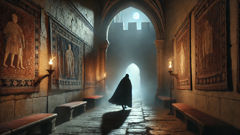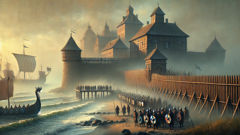Introduction
In the cold, wind-battered halls of medieval Denmark, where the North Sea’s fog rolled over craggy cliffs and birch forests, the fate of the royal house often rested on the edge of a blade—or the weight of a clever mind. The legends of this land are woven from blood, wit, and the fierce, unyielding pride of its people. Among these stories stands one of particular intrigue: the saga of Amleth, a prince born into greatness but shadowed by treachery. His story, first chronicled in Saxo Grammaticus’s Gesta Danorum, is one of cunning in the face of overwhelming odds, of justice wrested from a world that seems to favor the strong over the right. In this retelling, we journey into a Denmark both real and legendary, where ancient gods are whispered of in the longhouses, and the echoes of war never truly fade. The court of King Horwendil, once a place of feasting and honor, is now darkened by betrayal. Amleth’s uncle, the ambitious and ruthless Feng, has seized the throne through murder, and the rightful prince is forced to play the fool to survive. But beneath Amleth’s feigned madness lies a mind sharper than any sword. As the tale unfolds, alliances are tested, loyalties betrayed, and a prince’s cunning becomes Denmark’s hope for redemption. Through dense forests and icy courtyards, from the silent corridors of Elsinore’s great hall to the storm-lashed battlements, Amleth’s journey is a testament to the enduring power of justice—even when it must be won through deception. His is a legend that has shaped not only Denmark’s sense of identity but has echoed through centuries, inspiring storytellers and poets alike. Here, the ancient world breathes again, rich with detail and the struggle for what is right in a kingdom on the brink.
The Seeds of Betrayal
The story of Amleth begins long before the shadow of murder fell across Elsinore. In the days of King Horwendil, Denmark was a land of prosperity and pride. The king was beloved for his wisdom and strength, ruling from his seat in Jutland with his queen, Gerutha, and their only son, Amleth. Tales of Horwendil’s victories against Norway’s raiders rang out in the smoky feasting halls. Yet beneath the veneer of unity, a festering jealousy grew in Horwendil’s brother, Feng. Unlike his regal sibling, Feng was a man of ambition unchecked by conscience. Where Horwendil was generous, Feng was calculating, his laughter quick but hollow. He longed for power, eyeing the throne with a hunger that could not be sated by the privileges of the king’s brother.

It was during a spring of uneasy peace that Feng struck. With a handful of trusted men—swordsmen loyal more to coin than kin—he orchestrated the king’s murder. The night was thick with rain, drowning out Horwendil’s final cries. By dawn, Denmark had lost its king and gained a new one. Feng seized Gerutha as his wife and declared himself ruler, his hands stained with fratricide but his eyes cold with triumph. The court was silenced, for who would dare question a king who had already killed his own brother? The people mourned, but quietly. Only Amleth, then barely a man, refused to show his sorrow openly. He understood, even at his tender age, that showing his true feelings would mean his death.
In the months that followed, Amleth became a ghost within the palace—silent, withdrawn, staring at the hearth as if lost to madness. Servants whispered about the prince’s addled mind, and courtiers exchanged knowing glances. But the truth was far more complex. Amleth wore madness as a shield, crafting his every word and gesture to convince Feng that he was no threat. He let his hair grow wild and his clothes hang in tatters, mumbling to himself and building strange contraptions out of sticks and bones. Behind this mask, however, he observed everything: Feng’s paranoia, Gerutha’s quiet grief, the shifting alliances of the court. He noted which nobles flocked to the new king’s side and which servants looked away when he passed. Amleth’s isolation became his greatest weapon. When spies were sent to test him, he outwitted them with riddles and nonsense, driving them away with his feigned lunacy. His every action was calculated, each mad antic a deliberate step in his plan for survival.
But survival was not enough. In the lonely hours before dawn, Amleth swore to his murdered father’s memory that he would one day avenge the wrong done to his house. His greatest challenge would be to bide his time, all the while evading Feng’s suspicion. The court grew accustomed to the mad prince’s presence, some even mocking him openly. But Amleth watched, waited, and learned. He knew that when the moment came to strike, he would need more than just courage—he would need every ounce of wit and cunning Denmark had ever known.
The Dance of Deceit
As the years passed, Amleth’s act of madness became legend within the castle walls. Children of the court grew up with tales of the wild-haired prince who howled at the moon and spoke in riddles to his own reflection. Yet behind closed doors, Gerutha visited her son whenever she dared. Though their meetings were brief and often cloaked in sorrow, Amleth drew comfort from her presence. She spoke in whispers, warning him of Feng’s suspicions and urging him to keep up the charade. Together, mother and son mourned Horwendil in secret, sharing small tokens—a lock of hair, a battered toy from childhood—that kept their hope alive.

Feng, meanwhile, grew restless. He’d taken Denmark, but peace eluded him. The people remembered Horwendil’s justice; whispers of discontent filtered into the great hall. The king’s advisors urged him to rid himself of Amleth once and for all. At first, Feng hesitated, fearing the wrath of the gods should he kill his own nephew. But paranoia gnawed at him. He devised a series of tests to confirm Amleth’s madness, sending spies to provoke the prince into revealing himself. Each time, Amleth outmaneuvered them. When two courtiers tried to catch him in a lie, he spun elaborate tales of talking trees and feasts attended by ghosts. When a servant left a blade near his bed, hoping to catch him plotting violence, Amleth used it to whittle a wooden flute, serenading the castle rats.
But Feng would not be deterred. He arranged a marriage between Amleth and a foreign princess, hoping to send his nephew away from Denmark. Amleth, however, feigned such wild terror at the prospect that the alliance fell through. In desperation, Feng summoned two childhood friends of Amleth’s—Rostro and Viggo—to spy on the prince. The friends, torn between loyalty and survival, tried to coax sense from Amleth. He greeted them with a cryptic smile, leading them on wild chases through the castle’s dungeons and secret passages. One night, they found him digging holes in the courtyard by moonlight. When they asked what he searched for, he replied, "The seeds of truth are buried deep. Only a madman dares dig so close to the throne."
Unsettled, Rostro and Viggo reported back to Feng, confirming only what the king wanted to hear: that Amleth was irredeemably mad. But still, the new king could not sleep easy. In the quiet hours before dawn, he paced the corridors, haunted by dreams of Horwendil’s blood on his hands. Yet even as Feng’s paranoia grew, Amleth’s patience wore thin. The prince was no longer content to simply survive. His mind turned to vengeance, and he began to lay the groundwork for a reckoning that would shake Denmark to its foundations.
The Trap Set and Sprung
It was during a harsh winter that Feng finally resolved to end Amleth’s life. Tired of uncertainty, he summoned a group of his most loyal men and entrusted them with a simple command: escort the prince to England and deliver a sealed letter to the English king. The letter contained instructions for Amleth’s execution, couched in diplomatic language but clear in intent. The journey to England was long and treacherous, crossing icy seas and snow-clad forests. Amleth traveled in silence, his companions wary but convinced of his madness. Yet once on English soil, Amleth acted with astonishing clarity. While his escorts feasted in an inn, he discovered the letter and deftly swapped it for one of his own making. In the new message, the English king was instructed to kill not Amleth, but his escorts.

When they arrived at the English court, the king—bound by custom to obey the wishes of his Danish counterpart—read the letter and ordered the execution of Feng’s men. Amleth stood by in silent composure, mourning only that he could not save men who were ultimately tools in a greater game. The English king, impressed by the prince’s composure and wit, invited him to stay. But Amleth declined, knowing his destiny lay in Denmark. Before leaving, he gained a powerful ally: the English king’s daughter, a woman as clever and sharp-eyed as himself. They exchanged vows of friendship—and perhaps something deeper—before Amleth sailed for home.
Back in Denmark, Feng believed himself finally rid of his nephew. He held feasts and gave thanks to the gods, unaware that his nemesis was already on his way back across the North Sea. Amleth returned under cover of night, slipping into the castle with the aid of a handful of loyal servants. The halls were quieter than he remembered, the air thick with secrets and old sorrow. He found Gerutha alone by the hearth, her hair streaked with gray and her eyes hollow from years of grief. Mother and son embraced, their reunion wordless but fierce. Together they devised the final phase of Amleth’s plan.
On the night of Feng’s greatest feast—a celebration marking another year of his rule—Amleth struck. Disguised in the rags of a servant, he crept through secret passages until he reached Feng’s private chamber. There, he found his uncle dozing, wine cup in hand and sword carelessly by his side. With a single, silent motion, Amleth seized the blade and pressed it to Feng’s throat. The king awoke, eyes wide with terror, but it was too late. Amleth spoke only once: "Justice for my father, and for Denmark." With that, he fulfilled his vow. As dawn broke over Elsinore, Amleth emerged from the shadows—not as a madman, but as Denmark’s rightful king.
Conclusion
With the death of Feng, the pall that had shrouded Denmark for years finally lifted. Amleth stood before his people not as a broken prince but as a king forged in hardship and tempered by cunning. The courtiers who had once mocked his madness now knelt before him, murmuring their loyalty. In the days that followed, Amleth sought to heal the wounds left by his uncle’s reign. He honored his father’s memory with fair rule and wise counsel, drawing strength from those who had remained faithful. His mother Gerutha found peace at last, her son’s justice giving her heart rest after years of fear. The English princess joined Amleth at his side, their alliance a new bridge between lands once divided by war and suspicion.
Amleth’s story became legend not because of the battles he fought, but because of the mind that outwitted a kingdom gone astray. He showed Denmark—and all who came after—that justice sometimes must be won through patience and wit as much as by sword or shield. His name would echo through the centuries, inspiring poets and playwrights, remembered whenever Denmark’s sons and daughters needed courage to face injustice. In the cold light of dawn, as mist drifted from the sea and birdsong rose over Elsinore’s towers, a new era began—one shaped by the quiet strength of a prince who pretended to be mad so that he might, at last, set his kingdom right.


















